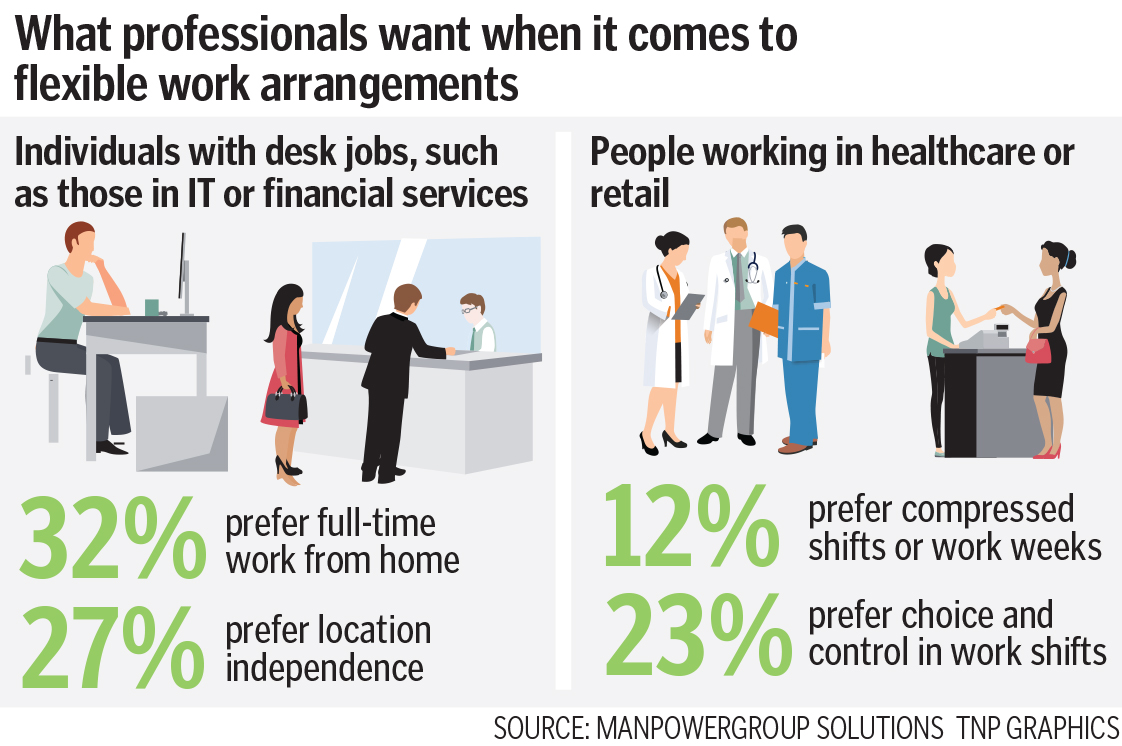Time for wiggle room at work
More people are naming flexibility as one of the top considerations when making career decisions
Workplace flexibility, as a way to manage talent, is no longer just an option.
Now more than ever, flexi-work policies are a key expectation for work-life balance and career decisions.
Globally, nearly two in five professionals want some form of latitude in when, where and how they work, according to a report by recruitment experts ManpowerGroup Solutions.
The 2017 report, Work, for Me: Understanding Candidate Demand for Flexibility, finds that going modular is key for the 14,000 professionals surveyed.
The 19-country survey involved managers to senior executives aged from 18 to 65 from countries such as Australia, China, Japan and the United Kingdom.
Reasons for the greater emphasis on flexi-work or schedule latitudes include the presence of multinational companies, workforce composition (such as more millennials), technology, economics and employment levels, and lengthy commute times.
New attitudes also matter. For example, 63 per cent of those surveyed do not believe they need to be at their desks to get work done.
In Singapore, the National Trades Union Congress wants economically inactive professionals, managers, executives and technicians (PMETs) to go back to work.
And paid job trials under its Returners Programme is one tactic that it hopes will draw the PMETs to do so.
Workplace flexibility includes a spectrum of work arrangements.
“Employers are rightly concerned about employee productivity. But yesterday’s practices must be aligned with today’s expectations.”
The eight types are: flexible arrival and departure times; full-time work from home/location independence; choice and control in work shifts; part-time work from home; compressed shifts or work weeks; sabbaticals; unlimited paid time-off; and caregiving leave. Of the types of schedule latitudes, modular arrival and departure times are the most important (26 per cent).
Next, is the ability to work from home or any other place the individual chooses (22 per cent).
Choice in the timing of work shifts is the third most desirable (15 per cent).
In countries such as China, where companies are growing fast and career success means long hours, the stress leads many to want sustained breaks from employment.
They use it to rest and skill up - confident that a thriving economy will make finding a new job easy.
TO WHOM IT MATTERS
Men
Schedule latitude is not just a working mum's priority. It is fast becoming a gender-neutral issue.
More men named flexibility as a top-three consideration when making career decisions in four out of five markets - Australia, Mexico, the UK and the United States. The biggest difference was in Australia: 40 per cent last year over 28 per cent in 2015.
Full-timers
Part-timers and those who work in the gig economy are not the only ones who like it modular. Full-timers appreciate wiggle room too.
Fifty-four per cent of those who prioritise flexibility as a top-three motivator prefer full-time work arrangements.
Specific sectors
Even sectors once thought unsuitable for non-traditional routines are accommodating such arrangements. It is a question of tailoring the options to meet the needs of both employers and employees, rather than ruling them out.
For instance, 32 per cent of those with desk jobs in the information technology and financial services sectors prefer working from home full-time. In hospital and retail sectors, where face-to-face contact is necessary, 12 per cent would like compressed shifts.

WHY IT MATTERS
Many companies struggle with corporate cultures that emphasise presenteeism. They unknowingly cultivate flexibility stigma, in which success is based on attendance rather than performance.
Employers are rightly concerned about employee productivity. But yesterday's practices must be aligned with today's expectations.
Increasingly, schedule versatility is cited as one of the top three motivators in making career decisions.
Its importance rose 17 per cent in the UK, 21 per cent in Australia, 29 per cent in the US and 30 per cent in China.
Your company may not be able to accommodate a host of flexible work practices. But you can offer a range of options to appeal to professionals at different stages of their lives, retaining talent and staying ahead of the competition.
This article is from ManpowerGroup Solutions, the global experts in outsourced, large-scale recruiting; within the United States-listed ManpowerGroup of companies (www.manpowergroup.com.sg)
Get The New Paper on your phone with the free TNP app. Download from the Apple App Store or Google Play Store now



